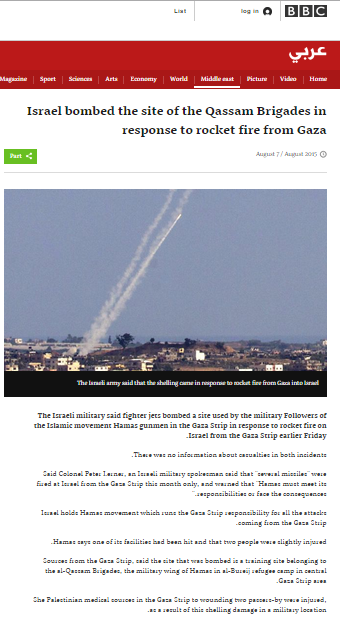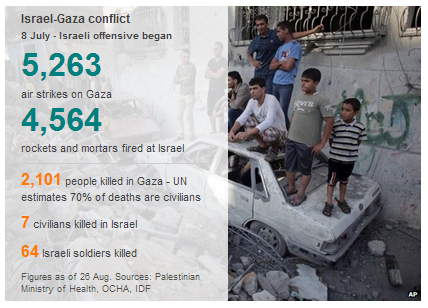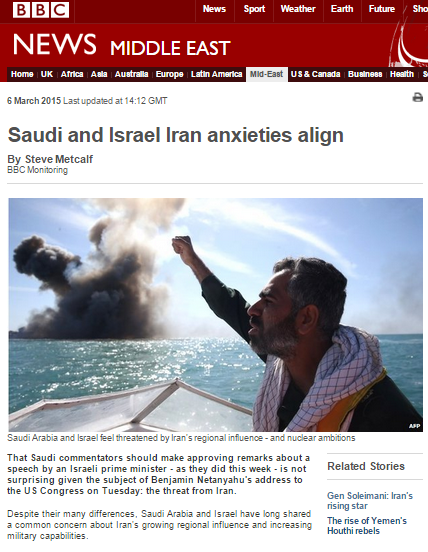Most of the coverage of Israel appearing on the BBC News website’s Middle East page over the past week has been devoted to the topic of the arson attack in Duma on July 31st (which has now claimed another life) and associated subject matter.
In addition to that attack, several other terrorist incidents took place in the region this last week.
On August 1st missiles were fired from the Gaza Strip and on August 6th another attack took place. In both cases the missiles fell short and landed in the Gaza Strip or near the border fence and the attacks were claimed by Gaza based Salafist Jihadists. BBC News did not report those attacks.
On August 7th one of several missiles fired from the Gaza Strip landed in the Kissufim area of southern Israel. The attack was claimed by Salafist Jihadists and the IDF responded with a strike on a Hamas training facility. In the now well-established pattern, there was no English language coverage of that attack but Israel’s response was reported on the BBC Arabic website.
On the evening of August 3rd a couple driving near the Beit Hanina junction in north Jerusalem were attacked with a firebomb.
“A 27-year-old Israeli woman was moderately hurt by the Molotov cocktail, suffering burns on her body. The woman and her husband abandoned their burning car, which proceeded to roll down and hit a 20-year-old pedestrian, who was lightly hurt.
A third man was lightly injured after he tried to extinguish the car.”
Despite at least one BBC staffer clearly being aware of the attack, it was not reported by BBC News on its website’s Middle East page.
On August 6th a vehicular attack took place near Shilo.
“Three IDF soldiers were wounded when a car deliberately ran into them on Thursday afternoon near the Shiloh junction north of Ramallah in the West Bank. The attacker was shot and neutralized by a fourth soldier.
Magen David Adom [ambulance service] reported that two were seriously wounded and another lightly. Officials said that one of the wounded was 20-years-old and suffered from a head injury.”
The attack was praised by Hamas and the Palestinian Islamic Jihad. Whilst the BBC was clearly aware of the incident and a report on the subject appeared on the BBC Arabic website, no English language coverage was to be found on the BBC News website’s Middle East page.
That same BBC Arabic report also mentions an explosion which occurred in Rafah in the Gaza Strip on August 6th, killing four people and wounding many others. Interestingly, whilst the BBC Arabic report unequivocally attributes the blast to “Israeli missile remnants” – i.e. unexploded ordnance – other media outlets reporting on that story were more cautious. Reuters reported:
“Media outlets of the Hamas Islamist group that controls the Gaza Strip blamed the blast on an unexploded Israeli missile from last year’s war.
The Hamas-run Interior Ministry said it was checking the cause of the explosion, which destroyed the home of Ayman Abu Nqeira, a Hamas member.”
The Guardian’s report on the subject states:
“Early reports suggested the blast was caused by unexploded ordnance (UXO) left from last summer’s 50-day war between Israel and Gaza. Swaths of Rafah were almost obliterated during weeks of shelling from air, sea and land. Ashraf al-Qidra, a spokesman for the Gaza ministry of health, said the dead men had been clearing rubble from a house that was destroyed during the war. The home was hit in an Israeli air strike on 9 July last year.
However, masked and armed men from Al-Qassam Brigades, Hamas’s military wing, blocked access to the area, fuelling suspicions that the house or a nearby property may have been used to store explosives or rockets. Some locals said the area was a weapons base for Al-Qassam Brigades; others said Israeli unexploded ordnance was the cause of the blast.
A spokesman for Gaza’s interior ministry said: “We can’t give a clear reason for what happened.” An investigation was under way, he added.”
Remarkably, BBC Arabic – part of the organization which describes itself as “the standard-setter for international journalism” – appears to have unquestioningly adopted and amplified the exact same line as Hamas’ media outlets.




